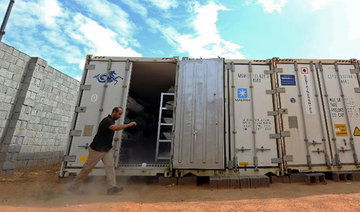ANKARA: Since the approval of its candidacy to EU membership in 1999, Turkish relations with Brussels have been strained, exacerbated by Turkey’s controversial moves in the eastern Mediterranean and concerns over its ongoing democratic issues.
Now, though, Turkey wants to begin a new era with the EU, despite recent diplomatic gaffes, such as the Sofagate crisis, when Ursula von der Leyen, president of the European Commission, was not given a seat next to President Recep Tayyip Erdogan during her high-profile visit to Ankara.
“Turkey keeps its determined stance and efforts toward its strategic goal of EU membership, despite the double standards and obstacles it faces,” Erdogan said in a statement on May 9, celebrated across the bloc as Europe Day. “Turkey’s membership will pave the way for the rise of a Europe that is more effective at regional and global levels, giving hope not only to its citizens, but also to the people of its neighborhood as well as the whole world.”
Some EU member states, especially Greece, France and Cyprus, continue to halt accession negotiations with Turkey, citing the country’s eroding democracy, human rights issues and the rule of law at home. The nonimplementation of European Court of Human Rights’ rulings by Ankara has also drawn anger from Brussels.
Dr. Ilke Toygur, CATS fellow at German think tank SWP Berlin, said that it is important to be realistic over Turkey’s prospects of joining the EU.
“After months of tensions in the Eastern Mediterranean, 2021 has (seen) a positive spin Turkey-EU relations. This positive agenda is, however, centered on fruitful cooperation rather than advancing Turkey’s accession negotiations,” she told Arab News.
Ankara is seeking an update to the 2016 refugee deal that obliges Turkey to stem the tide of people seeking to reach Europe from its shores in return for financial aid. EU Commissioner for Home Affairs Ylva Johansson paid a visit to Turkey on Friday for talks about the deal, and to discuss visa liberalization.
The EU offered Turkey €6 billion ($7.1 billion) to help Syrian refugees, but only €3.6 billion have been sent so far — a point of contention for Ankara. However, the deal was criticized by some EU member states, who claimed Turkey had used millions of Syrian refugees as leverage against Brussels to extract more money.
FASTFACT
Some EU member states, especially Greece, France and Cyprus, continue to halt accession negotiations with Turkey, citing the country’s eroding democracy, human rights issues and the rule of law at home. The non-implementation of European Court of Human Rights’ rulings by Ankara has also drawn anger from Brussels.
In February 2020, Turkey allowed thousands of migrants gathered on the border with Greece to make their way toward Europe.
Turkey’s negotiations to join the EU began in 2015, but the unresolved Cyprus conflict has always been a barrier to progress, while EU leaders continue to warn of sanctions against Turkey if the country continues exploring for gas and oil in contested waters claimed by Greece and Cyprus.
Ankara’s EU candidacy should be formally suspended if Turkey continues on its “autocratic track,” EU lawmakers at the European Parliament Foreign Affairs Committee stated on April 23, adding that the country no longer fulfilled the democratic criteria to be accepted as a candidate, let alone a full member, to the EU.
However, Turkey remains dependent on trade with the bloc. Exports to EU member states surged by 35 percent and reached $26.86 billion in the first four months of 2021. Ankara also expects the expansion of the EU-Turkey Customs Union to new sectors of its economy, like services and agricultural trade.
Toygur thinks the EU would like to work on existing trade issues and pave the way for Customs Union modernization; however, the process itself would require an official mandate and a lot of good will from both sides to settle issues of contention.
“High level of dialogue in older files, such as transport, economy or energy, as well as new files (such as) global health or climate change, are also concrete proposals on the table,” she said.
The German Marshall Fund’s latest public opinion survey “Turkish Perceptions of the European Union” revealed, however, that half of Turkish young people think the EU does not intend to let the country join the bloc.
Despite this, Turkish public opinion favors the EU as the closest partner in dealing with international matters, while this trend seems stronger in people aged 18-24 compared to the general population. 68.8 percent of Turkish young people said they would vote “yes” in any referendum on EU membership.


























